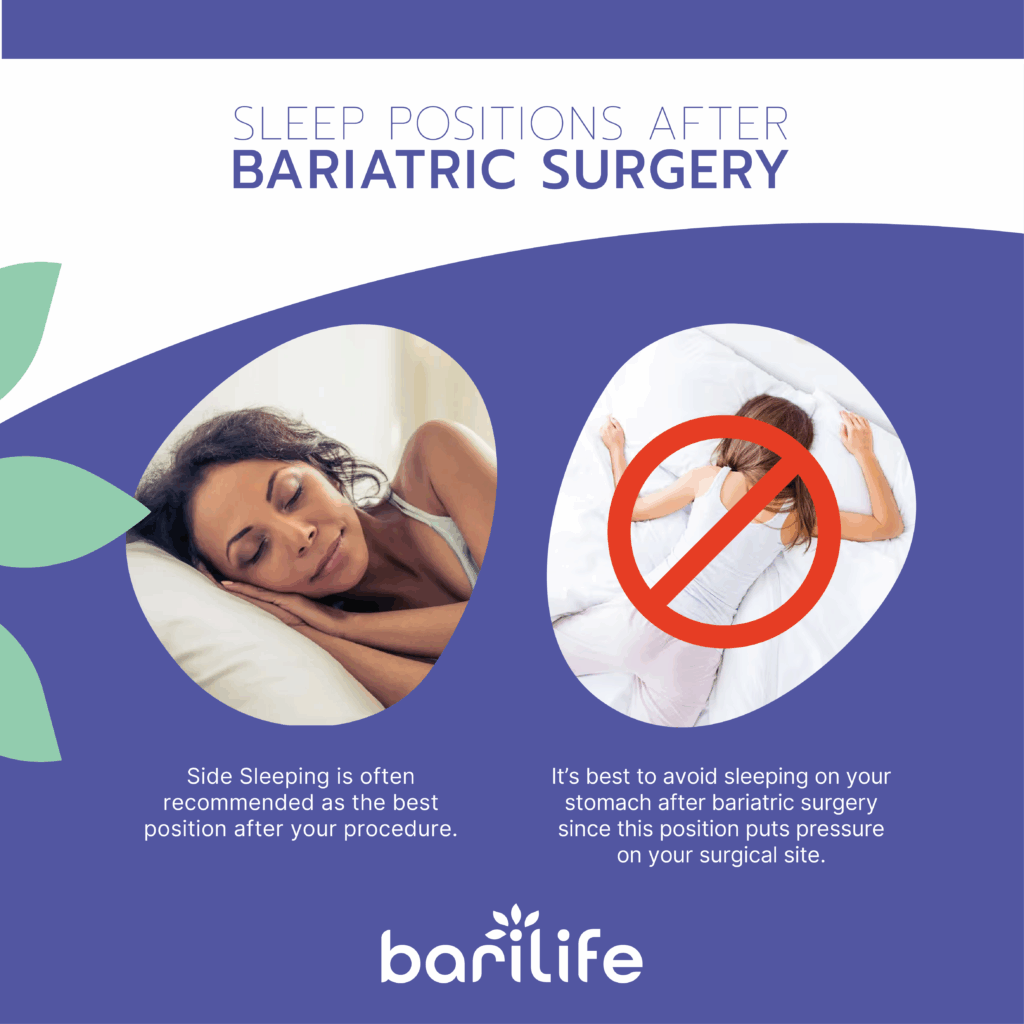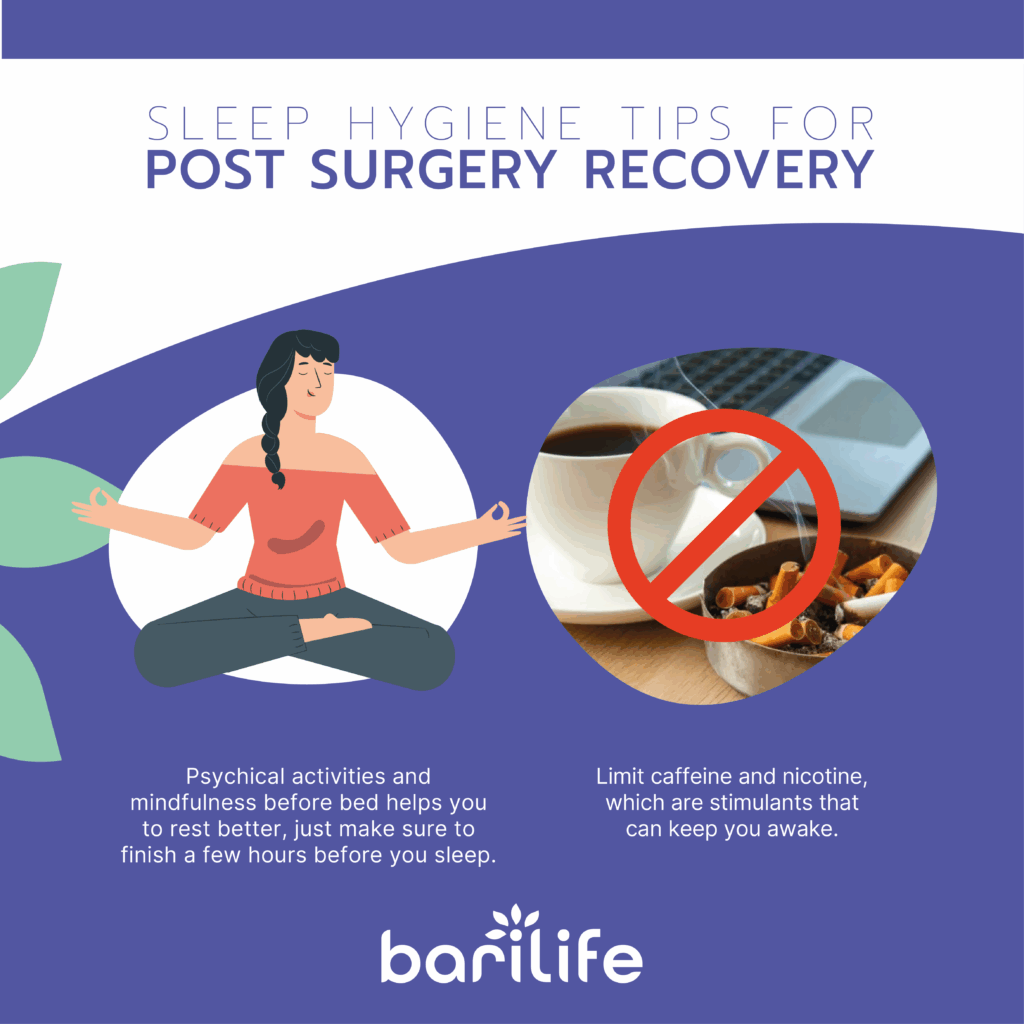Key Takeaways
- Side sleeping, particularly on your left side with your head elevated, is typically the most comfortable position after bariatric surgery.
- Creating a calm and comfortable sleep environment and following good sleep habits significantly improves your rest quality during recovery.
- Managing pain and acid reflux through proper positioning, meal timing, and medication helps you get the sleep you need to heal.
Getting good sleep after bariatric surgery might seem challenging at first. Your body is healing, you might be experiencing discomfort, and it can be tricky to find that ideal position for sleep. However, quality sleep is essential for your recovery and long-term success after weight loss surgery.For many individuals, life after bariatric surgery involves adjusting daily routines to accommodate physical and emotional healing—including improving sleep hygiene.
In this article, we share which sleep positions are the most comfortable, pain and acid reflux management tips, how to create a restful sleep environment, and more.
Table of Contents
Sleep Positions After Bariatric Surgery

Side sleeping is often recommended as the best position after your procedure. This reduces pressure on your surgical area and can be more comfortable as you heal. Many people find that sleeping on their left side works especially well because it helps minimize acid reflux, which is a common issue after weight loss surgery.
When you sleep on your side, place a pillow between your knees to keep your spine aligned. You might also benefit from hugging a pillow against your abdomen for additional support of your surgical area.
It’s also important to elevate your head while sleeping so as to avoid acid reflux. Use an adjustable bed or prop up the head of your bed with 6-8 inches of support. If you don’t have an adjustable bed, try using extra pillows so your upper body is elevated.
It’s best to avoid sleeping on your stomach after bariatric surgery since this position puts pressure on your surgical site and can strain your neck and spine. Back sleeping can be okay for some people, especially if your head is elevated.
Managing Pain for Better Sleep
Take pain medicine as advised by your doctor, especially during the early recovery period. Plan to take your pain medication about 30 minutes before bedtime to help ensure it’s working when you try to fall asleep.
Using pillows strategically can make a big difference in your comfort. Consider using a pillow to support your abdomen when you cough, laugh, or move in bed. This gentle pressure can reduce pain from these movements.
Dealing with Acid Reflux and GERD
Acid reflux and GERD are common concerns after bariatric surgery that can significantly impact your sleep quality. Certain foods can make acid reflux symptoms worse. Try avoiding:
- Spicy food
- Citrus fruits
- Tomatoes
- Onions
- Garlic
- Chocolate
- Mint
- Caffeinated
- Beverages
- Alcohol
- Carbonated drinks

Another tip is to eat your meals at least three hours before bed to give your body time to digest food before lying down. Also, eating smaller portions and more frequent meals throughout the day instead of three large meals also helps reduce reflux symptoms.
As mentioned earlier, sleeping on your left side with your head elevated offers the best protection against nighttime reflux. This position keeps your stomach below your esophagus, making it harder for acid to flow upward.
Creating a Comfortable Sleep Environment
Keep your bedroom cool, dark, and quiet. Most people get their best sleep in a room between 62-82°F (17-28 ℃) . Use blackout curtains if necessary to block outside light, and consider having a white noise machine if sounds disturb your sleep.
Keep a consistent sleep schedule by going to sleep and waking up at the same time every day, even on the weekends. This aids in maintaining your body’s internal clock and enhances the quality of your sleep.
Limit exposure to screens (phones, tablets, computers, TV) at least one hour before bedtime. Studies show that exposure to excessive screen time before bed decreases sleep quality.
Addressing Sleep Apnea and Breathing Issues
If you used a continuous positive airway pressure (CPAP) machine before surgery, you’ll likely need to continue using it initially after your procedure. The CPAP helps keep your airways open during sleep, ensuring you get enough oxygen and reducing disruptions to your sleep cycle.
As you lose weight following surgery, your sleep apnea symptoms may improve. However, don’t stop using your CPAP without consulting your healthcare provider. They can determine if and when it’s appropriate to adjust your therapy.
Sleep Hygiene Tips for Post-Surgery Recovery
Consistent physical exercise can help you to fall asleep faster and get deeper sleep. Even light walking can make a difference. Just be sure to finish working out at least a few hours before you sleep.

Practice mindfulness or meditation before bed to calm your mind. Surgery and recovery can be stressful, and anxiety can interfere with sleep. Taking 10 minutes to practice mindfulness can help your mind transition from a busy day to a restful night.
Limit caffeine and nicotine, which are stimulants that can keep you awake. Avoid caffeine after noon, and if you smoke, work with your healthcare provider on a plan to quit, as smoking can disrupt sleep and slow healing.
Develop a sleep time routine that tells your body it’s time to wind down. This might include taking a warm shower, doing gentle stretches, reading, or practicing relaxation techniques.
When to Seek Medical Help
Reach out to your healthcare provider if you experience severe or persistent pain that isn’t relieved by your prescribed medications. This could indicate a complication that needs medical attention.
Severe acid reflux that continues despite following positioning and dietary recommendations should also be reported. Symptoms like chest pain, difficulty swallowing, or vomiting require prompt evaluation.
Discuss these symptoms with your doctor if you see signs of sleep apnea, such as snoring, gasping for air while asleep, or excessive daytime sleepiness.
Conclusion
Finding comfortable ways to sleep after bariatric surgery is an important part of your recovery journey. By focusing on proper positioning, managing pain and reflux, creating a sleep-friendly environment, and creating a good sleep routine, you can enhance the quality and quantity of your sleep during this critical healing period.
Quality sleep supports healing, helps manage hunger and cravings, and contributes to your overall success after bariatric surgery. So think of getting good sleep as an investment in your long-term health and well-being.
How Bari Life Can Help
Getting proper nutrition is a vital part of supporting quality sleep and overall recovery after bariatric surgery. Bari Life’s specialized supplements are designed specifically to address the unique nutritional needs of people recovering from bariatric procedures, offering a wide range of products.

For those dealing with nighttime acid reflux, our bariatric protein shakes and bariatric protein bars can help you meet your nutritional needs without the discomfort of large meals. These options are easy to digest and ideal for people with smaller stomach capacity. Our bariatric snacks are also crafted to provide essential nutrients in convenient, portion-controlled servings.
Our products are designed to be gentle on your new digestive system while providing the nutrition you need for healing and energy. Whether you need bariatric vitamins chewable, a bariatric multivitamin with iron, or a liquid bariatric vitamin, Bari Life offers solutions tailored to every stage of your post-surgery journey.
In addition, our bariatric probiotic supports gut health and digestion, which is crucial after surgery, while our bariatric vitamins for hair loss help maintain healthy hair and overall appearance during the recovery phase.
Visit Bari Life today to discover how our specialized bariatric vitamins, and supplements can support your recovery, improve your sleep, and help you get the best possible results from your surgery.
If you want to learn more, why not check out these articles below:
- Powerlifting After Bariatric Surgery
- How To Build Muscle After Bariatric Surgery?
- Toning Exercises After Bariatric Surgery
- Exercise After Bariatric Surgery
- Transfer Addiction After Bariatric Surgery
- Smoking After Bariatric Surgery
- Sex After Bariatric Surgery
Resources
Chow, C. M. (2022). Sleep Hygiene Practices: Where to Now? Hygiene.
Chow, A., et al. (2021). Smoking in bariatric surgery: a systematic review. Surg Endosc.



What are your tips and tricks to post-bariatric success?